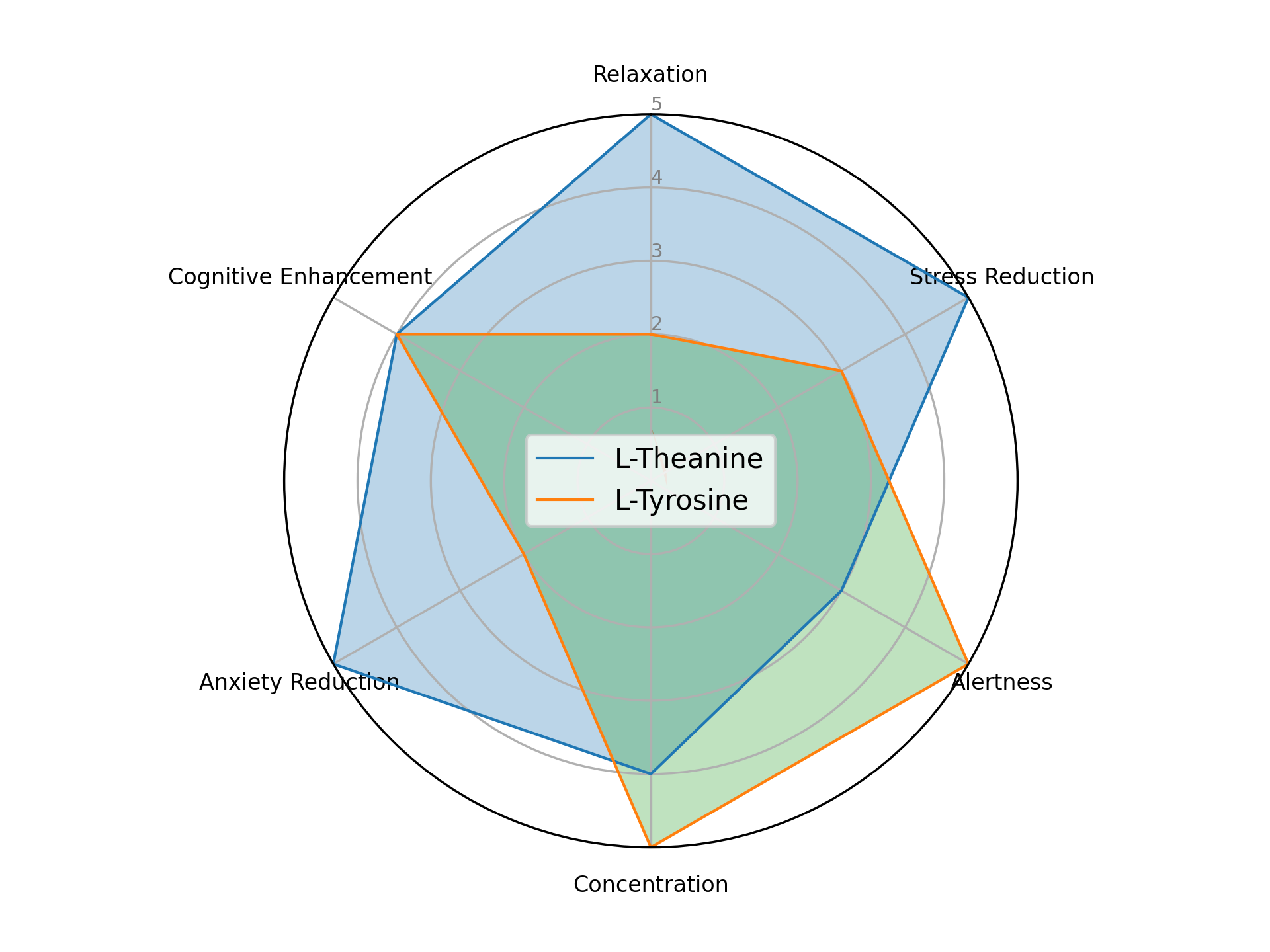For students cramming for exams or professionals seeking that limitless feeling of peak mental performance, supplements like L-theanine and L-tyrosine offer promising benefits. Both compounds occur naturally and play crucial roles in the body. L-theanine is found in green tea, while L-tyrosine is present in high-protein foods like meat, dairy, beans, and nuts.
Though they share some similarities, L-theanine and L-tyrosine have distinct differences in their chemical structures, mechanisms of action, and effects on the brain and body. This article provides an in-depth look at each supplement, comparing their benefits and helping you decide which one might be your key to unlocking enhanced cognitive function and high level mental clarity.
What's the difference between L-theanine and L-tyrosine?
The main difference between L-theanine and L-tyrosine lies in their structural composition and impact on neural activity. L-theanine induces calmness by amplifying alpha brain waves and GABA functions, promoting relaxation and stress reduction. In contrast, L-tyrosine invigorates the mind, enhancing alertness and concentration.
| Category | L-Theanine | L-Tyrosine |
|---|---|---|
| Chemical Structure | Contains ethylamine group bound to glutamate backbone | Contains phenol ring, carboxylic acid, and amine group |
| Mechanism of Action | Increases serotonin, GABA, alpha waves; reduces cortisol | Converts into L-DOPA to make catecholamines |
| Primary Effects | Relaxing; reduces anxiety and stress | Stimulating; boosts alertness, attention and arousal |
| Neurotransmitters Affected | Increases serotonin, GABA | Increases dopamine, norepinephrine |
| Typical Dosage | 100-400 mg | 500-2000 mg |
| Known Side Effects | None known | Possible nausea and headache |
| Proposed Cognitive Benefits | Reducing stress, anxiety, and fatigue; Enhancing attention, focus, and learning; Improving sleep quality; Neuroprotection and cognitive enhancement | Boosting focus, working memory, and processing speed; Improving mood and preventing stress-induced depression; Enhancing motivation, alertness, and attention |

L-tyrosine boosts catecholamine neurotransmitters like dopamine and norepinephrine. Simply put, L-theanine is ideal when you want to unwind, while L-tyrosine is better for enhancing cognition and alertness. By understanding their differences, you can choose the supplement that aligns with your needs and goals. Whether you take them separately or together, be mindful of optimal dosage ranges to avoid side effects. With an informed approach, these amino acids offer safe ways to support your mind-body balance.
What are the main benefits of L-theanine over L-tyrosine?
The main advantages of L-theanine over L-tyrosine include reduced anxiety, better sleep quality, deeper calm/relaxation, and offsetting the overstimulation of caffeine. L-theanine also has excellent long-term safety with no buildup of tolerance. L-tyrosine is not inherently better for relaxation and in excess can become overstimulating. Carefully weigh their differences.
What is L-Theanine?
L-theanine is an amino acid analog of glutamate and glutamine found primarily in plant and fungal species. L-theanine is an amino acid found in tea leaves.
and the term "theanine" without a prefix generally refers to the L-enantiomer, which is the biologically active form.L-theanine has been shown to increase alpha brain wave activity, which is associated with a relaxed but focused state.
Chemical Structure
The chemical structure of L-theanine consists of an ethylamine group bound to a glutamate backbone. The ethylamine contributes to L-theanine's ability to cross the blood-brain barrier and exert psychoactive effects.
Mechanism of Action
Once in the brain, L-theanine promotes alpha brain waves which are associated with relaxed wakefulness. It appears to modulate various neurotransmitters and signaling molecules:
- Increases Serotonin - Boosts this mood-regulating neurotransmitter
- Increases GABA - This inhibitory neurotransmitter reduces neuronal excitability
- Reduces Cortisol - Blunts stress-induced increases in the stress hormone cortisol
- Increases BDNF - Boosts levels of brain-derived neurotrophic factor involved in neurogenesis
- Increases Alpha Brain Waves - Promotes relaxation without drowsiness
Effects and Benefits
Numerous studies have found L-theanine supplementation to be safe and effective for:
- Reducing stress, anxiety and fatigue
- Enhancing attention, focus and learning
- Improving sleep quality
- Supporting deeper relaxation and meditative states
- Neuroprotection and cognitive enhancement
- Augmenting the benefits of caffeine by attenuating overstimulation
Typical dosages range from 100-400 mg taken up to three times daily. L-theanine has an excellent safety profile, with no known toxicity or adverse effects at moderate dosages. It has GRAS (Generally Recognized as Safe) status in the United States.
What is L-Tyrosine?
L-tyrosine is a non-essential amino acid used by the body to produce proteins and neurotransmitters critical for physical and mental performance. This powerful substance plays a pivotal role in the production of important chemicals in the body such as dopamine, adrenaline, and melanin among others.
Among its various benefits, the effect of L-tyrosine on cognitive capabilities is significantly noteworthy. Research has indicated that L-tyrosine can potentially enhance cognitive performance and working memory, particularly during stressful situations or when multitasking. This makes it a valuable supplement for individuals whose work or lifestyle involves prolonged stressful conditions, complex cognitive tasks, or both.
In addition, this amino acid is believed to benefit individuals struggling with certain medical conditions. Those with phenylketonuria, a genetic disorder wherein the body can't process another amino acid called phenylalanine, often take L-tyrosine as a supplement. If left untreated, phenylketonuria can lead to brain damage and intellectual disabilities, making the role of L-tyrosine vital in such cases. Individuals dealing with depression may benefit as well, since L-tyrosine can increase the levels of certain neurotransmitters that influence mood.
Chemical Structure
The structure of L-tyrosine contains a phenol ring, carboxylic acid, and amine group. This enables L-tyrosine to act as a precursor for catecholamine neurotransmitters after converting into L-DOPA.
Mechanism of Action
L-tyrosine boosts concentrations of dopamine, norepinephrine and epinephrine by providing the amino acid building blocks for their synthesis. Exact mechanisms include:
- Converts into L-DOPA - This is then converted into dopamine and other catecholamines
- Restores Neurotransmitter Depletion - Replenishes depleted dopamine, adrenaline etc. caused by stress
- Increases Mental Arousal - Catecholamines increase energy, motivation, alertness and attention
- Antagonizes Stress Effects - Blunts declines in cognition and mood caused by stressors
- May Increase Growth Hormone - Boosts hGH which enhances cognition and neural function
Effects and Benefits
Research suggests L-tyrosine may offer benefits for:
- Boosting focus, working memory and processing speed
- Improving mood and preventing stress-induced depression
- Enhancing motivation, alertness and attention
- Restoring cognitive performance impaired by demanding situations
- Improving exercise tolerance and reducing fatigue
- Preventing decline in cold weather or other extreme environments
L-tyrosine dosages typically range from 500-2000 mg per day. Minor side effects can include nausea, headache and irritability at very high dosages. It's considered very safe when taken as recommended.
Similarities Between L-Theanine and L-Tyrosine
When comparing L-theanine and L-tyrosine, it's important to note that they have several key similarities despite their differing mechanisms of action.
First, both compounds are amino acids that occur naturally in foods we eat regularly. L-theanine is found in green tea, while L-tyrosine occurs in high protein foods like eggs, meat, dairy, beans and nuts.
Second, both are considered very safe when taken at recommended dosages for supplementation. Research has not uncovered any concerning toxic effects or adverse events associated with moderate intakes of L-theanine or L-tyrosine.
Third, both amino acids are able to effectively cross the blood-brain barrier and influence neurotransmitter activity in the brain when supplemented.
Fourth, studies show both L-theanine and L-tyrosine may offer cognitive enhancing benefits related to focus, attention, learning, memory, relaxation and mood stabilization. Finally, because of their complementary effects on brain function, L-theanine and L-tyrosine are often formulated together in nootropic supplements or stacks.
The stimulating L-tyrosine can enhance motivation, alertness and concentration, while the calming L-theanine can reduce stress and prevent the over-arousal tyrosine may cause. More research is still needed, but initial findings suggest the two amino acids may provide synergistic nootropic effects.
- Both are amino acids found in food and common supplements
- Generally regarded as safe and well-tolerated at typical dosages
- Capable of crossing the blood-brain barrier and influencing neurotransmitters
- Linked to benefits for cognitive performance, mood, relaxation and focus
Often used together in nootropic stacks to provide complementary benefits.
What works better for focus L-theanine or L-tyrosine?
L-tyrosine is often more effective for boosting focus and concentration. It increases catecholamine neurotransmitters like dopamine and norepinephrine, which enhance mental arousal, alertness and motivation. L-theanine has a calming effect that can support focus by reducing stress and anxiety. However, L-tyrosine provides more direct stimulation of focus-related brain chemicals.
Which supplement is better for relaxation - L-theanine or L-tyrosine?
For relaxation, L-theanine is generally the preferred supplement. It promotes alpha brain waves associated with wakeful relaxation. L-theanine also increases GABA and serotonin, neurotransmitters that reduce anxiety and nervous tension. L-tyrosine is more stimulating, so it can undermine relaxation if taken in excess.
Can you take L-theanine and L-tyrosine together?
Yes, you can take L-theanine supplements and L-tyrosine supplements together because they both work in physiologically different ways. L-theanine promotes calming alpha waves and neurotransmitters like serotonin and GABA, while L-tyrosine stimulates catecholamines like dopamine and norepinephrine.
What is better for mental focus - L-theanine or L-tyrosine?
L-tyrosine is more effective at enhancing mental focus and concentration directly. It increases catecholamine neurotransmitters like dopamine and norepinephrine which stimulate neuronal activity and mental arousal. L-theanine supports focus indirectly by promoting relaxation and alpha brain waves.
Is L-tyrosine good for boosting productivity?
Yes, L-tyrosine can be an excellent nootropic for boosting productivity, By increasing dopamine and norepinephrine levels in the brain, L-tyrosine enhances motivation, focus, and mental arousal. This makes it easier to power through demanding cognitive tasks efficiently. L-tyrosine also helps counteract depleted neurotransmitter levels that lead to burnout. If you find your productivity lagging due to poor concentration or lack of drive, L-tyrosine could give you the neurochemical boost you need to optimize your output. Start with lower doses around 500mg and assess your tolerance.
Which works quicker - L-theanine or L-tyrosine?
L-tyrosine generally has a faster onset of action compared to L-theanine. Nootropics take different lengths of time to work based on factors like bioavailability and mechanism. L-tyrosine quickly converts to catecholamines which rapidly increase alertness and attention. L-theanine may take longer to accumulate and modulate neurotransmitters like serotonin and GABA underlying its calming effects.
Can L-theanine improve sleep quality?
Yes, L-theanine has been shown to enhance sleep quality, it is widely regarded as one of the best nootropics for sleep. L-theanine increases serotonin and GABA which promote restful sleep. It also counters hyperarousal caused by too much caffeine or stress.
Is L-theanine better than L-tyrosine?
Whether L-theanine or L-tyrosine is better depends on your needs and goals. L-theanine is superior for relaxation, unwinding and mood stabilization. L-tyrosine has advantages for boosting motivation, energy, and cognitive performance under demanding conditions. They can complement each other when stacked wisely. Assess your neurochemistry and desired effects.


